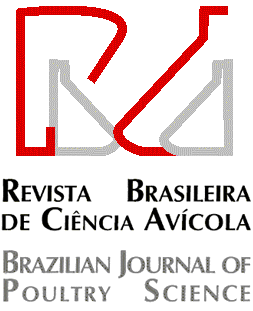The supplementation of vegetal diets with L-methionine (100% molar), methionine hydroxyl analogue (HMB) (88% molar) or DL-methionine (99% molar) was compared as to the performance of broilers allocated in cages and submitted to cyclic heat stress (CHS). The trial was carried out from 21 to 42 days of age. Two levels of synthetic methionine were supplemented for each methionine source (0.1 or 0.3 %), and the control treatment was not supplemented with synthetic methionine (negative control). Statistical analyses included the negative control treatment or were performed in a 3 x 2 factorial design (sources x levels). Addition of synthetic methionine to the basal level containing 0.63 % of total sulphur amino acids significantly improved feed conversion (FC) independent of the source. On the other hand, improvements in weight gain (WG) and body weight (BW) were more consistent comparing the negative control to HMB-supplemented treatments. Factorial analysis showed better FC for L-Met compared to DL-Met, whereas HMB showed intermediate results. The supplementation level of 0.3% methionine showed better FC than 0.1%. Methionine levels or sources had no effects on carcass, yields of cuts or feathering results. Therefore, results of DL-Met and HMB added to vegetal-based diets in comparable molar terms promoted similar performance in broilers under CHS conditions.
Methionine source; poultry; sulphur amino acids; temperature





